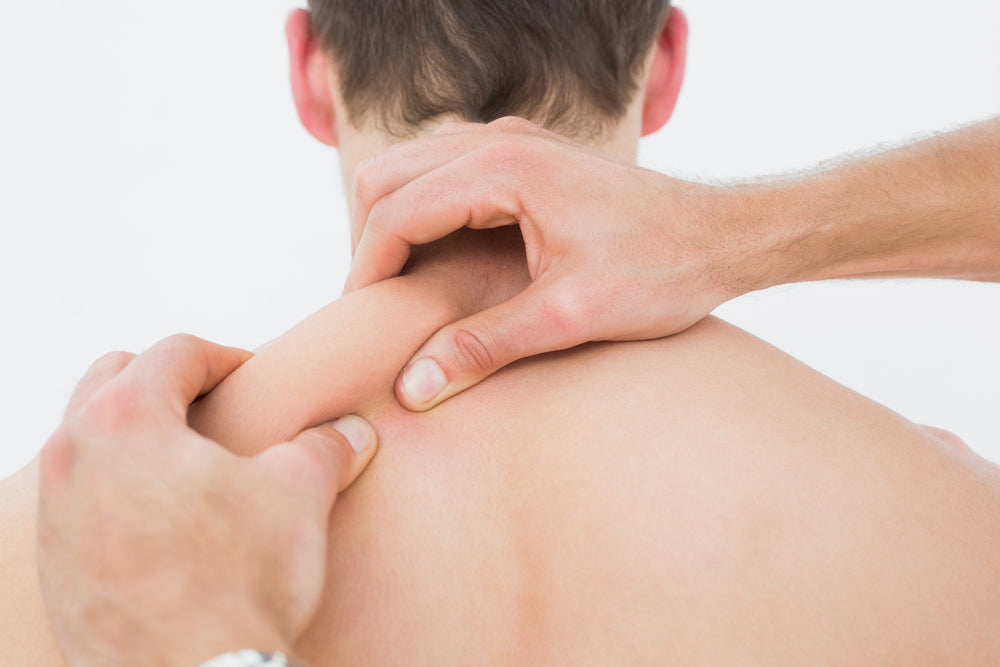Have you ever felt sore after a deep tissue massage and wondered what could be the cause?
If yes, you are not alone.
Deep-tissue massage is a type of therapeutic massage that focuses on realigning the deeper layers of muscles and connective tissue. When administered correctly, it can be very effective in relieving chronic pain, loosening tight muscles, and even helping to reduce stress.
With this wide range of benefits, it's no surprise that many people are turning to deep tissue massage for relief. However, while this type of massage therapy can be very beneficial, it can also lead to a range of side effects.
One side effect that people have experienced after a deep tissue massage is muscle soreness or fatigue muscles.
So, why does getting a deep tissue massage make one feel sore? Could it be a result of the massage itself, or maybe it's a sign of something else?
To separate fact from fiction, let's take a look at some of the possible causes of soreness following a deep tissue massage.
We'll also explore what you can do to alleviate this discomfort.
4 Reasons Why You May Feel Sore After Deep Tissue Massage Therapy
Experiencing soreness after a deep tissue massage session can be attributed to a number of possible reasons.
Here are just a few of them and how they might be linked to your therapy session:
1. Poor technique
One of the most common reasons for experiencing muscle soreness right after a deep tissue massage session is poor technique.
This can include applying too much pressure, not allowing your muscle fibers to relax, or massaging an injured or particularly sensitive area when using a self-massage tool. For people visiting a massage therapist, it could be a result of the therapist using too much force or not understanding the condition of your body.
This can cause your muscles to tense up, leading to soreness and discomfort.
2. Dehydration
Dehydration can also be a contributing factor to post-massage soreness.
As deep tissue massage involves the manipulation of deep layers of muscle and connective tissue, it can cause your body to lose fluids. If you don't have enough water in your system, these fluids won't be replaced.
This can lead to dehydration, which in turn can cause your muscles to feel sore and tired. Dehydration can also lead to other issues, such as muscle cramps and spasms, which can make your massage experience extremely uncomfortable.
3. Excessive massage sessions
How often you get a deep tissue massage can also influence how your body reacts to it.
While regular massage can be beneficial in the long run, having too many sessions in a short period of time can cause your muscles to become overworked and sore.
This is especially true when it comes to deep tissue massage, as this form of massage therapy involves applying more pressure than other types of massage.
When too much pressure is applied, it can cause your muscles to become overstimulated and fatigued, leading to soreness.
4. Deep muscle knots
Are you experiencing knotty areas in your muscles?
If yes, it's possible that you may be feeling some soreness after a deep tissue massage.
Knots are tight bands of tissue that can form in the muscles due to chronic stress or injury. They can be very painful and make it difficult to relax during a deep tissue massage session.
If you or your therapist focus too much on these knots while giving you a massage, it can cause further soreness.
These are just a few of the possible reasons why you may experience soreness after a deep tissue massage.
Whether it's due to poor technique, dehydration, over-massaging, or muscle knots, there are steps you can take to reduce the discomfort. That's what we'll be exploring in the next section. So, keep reading to find out more.
What to Do When Feeling Sore After Deep Tissue Massage Therapy
While it may be tempting to tough it out and just wait for the soreness to go away, there are things you can do to alleviate the discomfort. Some of them include:
Hydrate

Drinking plenty of fluids is key to relieving and even preventing soreness after your deep tissue massage session.
As mentioned earlier, deep tissue massage can cause your body to lose fluids, leading to dehydration. That's why it's important to drink plenty of water or other hydrating fluids before and after your massage session.
Doing so will ensure that your body has enough fluids to flush out toxins and reduce the effects of soreness. You should ideally aim for 8–10 glasses of water per day, and even more if you are engaging in physical activities.
If you are feeling especially sore, try drinking some electrolyte-filled drinks. Just ensure to avoid caffeine and alcohol, as these can act as diuretics, causing your body to lose even more fluids.
Take a warm or hot bath
Another way to help reduce post-massage soreness is to take a warm bath or shower.
Soaking in a tub of warm water or taking a hot bath can help increase circulation and reduce muscle tension, while the heat of the shower can help relax your muscles. This can, in turn, help reduce the effects of soreness and make you feel more comfortable.
You can also add Epsom salt to the bathwater to provide additional relief, as this mineral has anti-inflammatory properties and can help soothe muscle pain.
Other ways to apply heat to your sore muscles include using heating pads or warm compresses.
Use ice packs
If taking a warm bath or shower doesn't seem to help, using an ice pack can be beneficial.
Ice has a numbing effect on the skin and can help reduce inflammation. Plus, they feel great when applied to tight muscles.
When using an ice pack, make sure to wrap it in a towel before applying it to your skin. You should only apply the pack for 15-20 minutes at a time, as applying it for too long can cause skin irritation.
This way, you can enjoy the benefits of cold therapy without risking any damage to your skin.
Get plenty of rest after your massage session
Imagine taking a massage and then going straight to the gym.
Sounds like a recipe for disaster, right?
To make sure your body has enough time to recover from the massage session, it's important that you get plenty of rest after each session.
This will give your muscles time to heal and reduce any soreness. A good way to promote relaxation is to get a good night's sleep.
Also, ensure to avoid doing any strenuous exercise activities, such as going to the gym or running, for at least 24 hours after your massage session.
Stretch out the sore spots

Getting a massage can feel amazing, but it can also leave you feeling stiff and tight the next day.
So, to help reduce post-massage soreness, try doing some light stretches.
Stretching after a massage session can help promote blood flow throughout your body and reduce muscle tension. It's best to focus on stretching the areas that were massaged during your session, as this can help to further relax your muscles.
For instance, if you received a deep tissue massage on your back and neck, try doing some gentle stretches for those areas.
This way, you can enjoy the benefits of your massage session and reduce any post-massage soreness.
Take over-the-counter pain relievers
If your soreness is particularly severe, you can take an over-the-counter pain reliever to help ease the symptoms.
Commonly used medications such as ibuprofen and acetaminophen can provide relief from muscle aches and sharp pain. However, it is important to read the label carefully and take only the recommended dose.
This way, you can reduce any post-massage soreness while avoiding the risk of taking too much medication.
By following these tips, you can enjoy the benefits of a deep tissue massage without having to deal with soreness afterward. Just always remember to listen to your body and take it easy the day after your massage session.
Frequently Asked Questions
Find answers to some of the most common questions about why people feel sore after deep massage therapy.
Whether you're considering this type of treatment or have already received one, we hope these answers are helpful for you.
How long can one feel sore after deep tissue massage therapy?
How long you experience soreness after a deep tissue massage will depend on the severity of your muscles as well as how aggressive the massage was.
Generally, it is normal to feel some mild discomfort for up to 24 hours following the massage session. However, more intense massages may cause more pronounced sensations of soreness, which can last for up to 48 hours.
Between using a massage tool and visiting a therapist, when does one feel sore after a massage?
When it comes to understanding when one feels sore after a massage, it really depends on a number of factors we've discussed in this article.
However, the massage technique, intensity, and how it is performed can also influence the soreness one may feel.
For instance, using a massage tool may not be as deep and intense as a massage done by a licensed massage therapist. Remember, self-massage tools like the Fusion Elite come with adjustable intensity levels, allowing for a customized massaging experience.
So, therefore, it's likely that one will feel sore after a massage done with a tool, but it may not be as intense or long-lasting as the soreness experienced after visiting a therapist.
When should I seek help dealing with sore muscles after deep tissue massage?
If you experience persistent soreness or pain in your muscles after deep tissue massage, it is important to seek medical help.
This is especially true if the soreness persists for more than 48 hours or if you experience chronic muscle pain or swelling at the massage site. Other signs that indicate you should seek medical attention include fever, nausea, and dizziness.
In these cases, it is best to seek medical help in order to diagnose the source of your discomfort and determine an appropriate treatment plan.
Conclusion
Now that you know why people feel sore after deep tissue massage, you can take the necessary steps to reduce any post-massage soreness.
Possible causes of soreness can include poor technique, dehydration, dealing with muscle knots, and undergoing excessive massage sessions.
To help relieve and even prevent muscle soreness, try taking a warm bath or shower, using an ice pack, getting rest, stretching out sore spots, or taking over-the-counter pain relievers.
By following these tips, you can surely enjoy the benefits of deep tissue massage without having to deal with soreness afterward. Hope you found this article helpful and learned more about why people feel sore after deep tissue massage.
If you have any more questions, feel free to reach out to us, and we’ll be happy to answer them.



